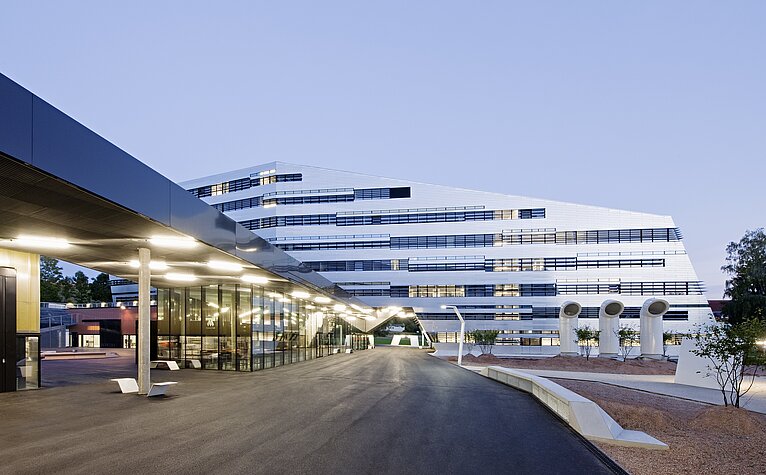 © Hertha Hurnaus
© Hertha Hurnaus
- Location advantages
- Innovation and digitalisation
- Research & development
- News
Fundamental AI Research Made in Austria
06. June 2024From the “Cluster of Excellence on Bilateral AI', one of the groundbreaking research initiatives of Johannes Kepler University of Linz, to the intensified activities of international technological leaders such as Amazon and Apple in Austria – discover the latest developments in the field of artificial intelligence in this article.
The "Cluster of Excellence on Bilateral AICluster of Excellence on Bilateral AI ()“ is a high calibre research initiative in Austria led by Prof. Sepp Hochreiter at the Johannes Kepler Universität Linz. This project is part of the excellence initiative “excellent=austria” of the Austrian Science Fund (FWF) and brings together Austrian research institutions such as the Institute of Science and Technology Austria (ISTA), the Technical University Wien, the University of Klagenfurt, the Technical University of Graz und the Vienna University of Economics and Business (WU). Featuring a budget of € 33 million, the cluster is planned for a period of five years, which can be extended to ten years and a total budget of € 70 million if it proves to be successful. The cluster strives to integrate symbolic and sub-symbolic AI, which comprise the two main cornerstones of AI research.
Austria is proud to be home to three of the 40 European ELLIS Units40 European ELLIS Units (). These "European Laboratories for Learning and Intelligent Systems” are located in Linz, Graz and Vienna, underscoring the leading position of the country in the field of AI research.
At the same time, the federal state of Upper Austria is providing an additional € 5.75 million in funding to support Cooperative Research and Development Projects focusing on artificial intelligence. This research promotion drive commenced on 5 April 2024 and aims to position Upper Austria as a leading model region for AI. The funding programme concentrates on projects with the potential to have a transformative impact on various socially relevant areas such as energy, traffic, and healthcare by designing them to be more efficient and ecologically compatible as well as to conserve resources.
Furthermore, global technological leaders such as Amazon, Apple, Intel, and Sentry rely on Austria as a location for pioneering research and development projects in AI and digitalisation, thus further strengthening Austria’s role as a driver of innovation. Dynatrace, a company based in Linz, is also very active in this field. Boasting specialised expertise in AI observability and security, Dynatrace monitors AI applications, identifies potential problems, and ensures compliance with data protection and security guidelines. Moreover, Dynatrace is building a seven-storey engineering campus in Linz for 1,500 international developers.
Research conducted within the context of the cluster and the additional funding from Upper Austria have the potential to decisively contribute to the sustainable development of AI systems which fulfil both technical as well as social standards and could have far-reaching consequences on society and industry.
The upcoming TedAI ConferenceTedAI Conference () in Vienna in October will also emphasize Austria’s key role in promoting discussions and partnerships within the global AI community. Another highlight in the Austrian AI calendar is the International Machine Learning Conference (ICML)International Machine Learning Conference (ICML) () scheduled to take place in Vienna in July. This conference is one of the most important events in the field of machine learning, attracting specialists and scientists from all over the world.
The AI Bachelor and Master Programme at Johannes Kepler University of Linz, initiated in the year 2019, also contributes towards ensuring talent availability. With 2,000 international students being taught in English, this programme offers a unique and independent course of studies in artificial intelligence in Linz, Vienna and Bregenz.